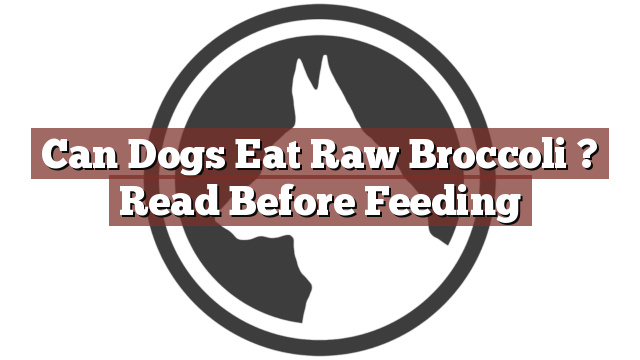Understanding Your Dog’s Dietary Needs
As pet owners, it is essential to understand our dog’s dietary needs to ensure their health and well-being. While it may be tempting to share our own food with our furry friends, it is crucial to be aware of what is safe and healthy for them to consume. A balanced diet specific to their species and size is key to maintaining their overall health.
Can Dogs Eat Raw Broccoli? Read Before Feeding
Many dog owners often wonder, "Can dogs eat raw broccoli?" Well, the answer is yes, dogs can eat raw broccoli. Broccoli is a nutritious vegetable that belongs to the same family as cauliflower and cabbage. It is packed with essential vitamins, minerals, and fiber, making it a healthy addition to your dog’s diet. However, it is important to keep in mind a few considerations before feeding broccoli to your furry companion.
Pros and Cons of Feeding Broccoli to Dogs
Feeding broccoli to your dog has its pros and cons. On the positive side, broccoli is low in calories and high in fiber, which can aid in digestion and help prevent constipation. It is also a great source of vitamins C and K, as well as potassium and folate. These nutrients can contribute to a stronger immune system, healthier bones, and improved heart health in dogs.
However, there are a few things to be cautious about when including broccoli in your dog’s diet. First, some dogs may have difficulty digesting raw broccoli, leading to stomach upset or gas. To make it easier for your dog to digest, you can lightly steam or boil the broccoli before feeding it to them. Additionally, broccoli contains a compound called isothiocyanate, which, in large quantities, can cause gastrointestinal irritation in dogs. It is important to feed broccoli to your dog in moderation and observe how they react to it.
Conclusion: Considerations for Feeding Broccoli to Your Dog
In conclusion, while dogs can eat raw broccoli, it is essential to consider their individual needs and reactions. As with any new food, it is recommended to introduce it gradually into your dog’s diet. Pay attention to any signs of discomfort or allergies, such as diarrhea or vomiting. If your dog exhibits any negative reactions, it is best to consult with a veterinarian before continuing to feed them broccoli. Remember to serve broccoli in small portions and monitor your dog’s digestion and overall well-being.
When it comes to feeding your dog a varied diet, it is always best to consult with a veterinarian to ensure their individual dietary needs are met. A professional can provide personalized advice based on factors such as your dog’s age, size, and overall health. By taking these considerations into account, you can provide your furry friend with a nutritious and well-balanced diet that includes occasional treats like raw broccoli.
Thank you for taking the time to read through our exploration of [page_title]. As every dog lover knows, our furry friends have unique dietary needs and responses, often varying from one canine to another. This is why it's paramount to approach any changes in their diet with caution and knowledge.
Before introducing any new treats or making alterations to your dog's diet based on our insights, it's crucial to consult with a veterinarian about [page_title]. Their expertise ensures that the choices you make are well-suited to your particular pet's health and well-being.
Even seemingly harmless foods can sometimes lead to allergic reactions or digestive issues, which is why monitoring your dog after introducing any new food item is essential.
The content provided here on [page_title] is crafted with care, thorough research, and a genuine love for dogs. Nevertheless, it serves as a general guideline and should not be considered a substitute for professional veterinary advice.
Always prioritize the expert insights of your veterinarian, and remember that the health and happiness of your furry companion come first.
May your journey with your pet continue to be filled with joy, love, and safe culinary adventures. Happy reading, and even happier snacking for your canine friend!

